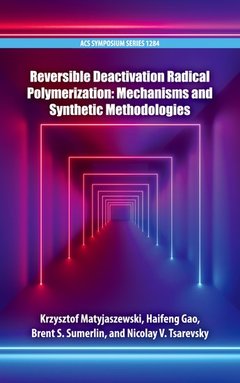Description
Reversible Deactivation Radical Polymerization
Mechanisms and Synthetic Methodologies
ACS Symposium Series
Coordinators: Matyjaszewski Krzysztof, Gao Haifeng, Sumerlin Brent S., Tsarevsky Nicolay V.
Language: English
Subjects for Reversible Deactivation Radical Polymerization:
Publication date: 05-2019
480 p. · 16.1x23.6 cm · Hardback
480 p. · 16.1x23.6 cm · Hardback
Description
/li>Biography
/li>
This volume comprises the topical reviews and specialists' contributions presented at the American Chemical Society symposium on Controlled Radical Polymerization (the IUPAC preferred term is Reversible Deactivation Radical Polymerization and it is used in the titles of these volumes). This most recent meeting was a sequel to several previous ACS Symposia on controlled/living radical polymerization. These two volumes are dedicated to mechanisms and techniques (volume 1 consisting of 18 chapters) and materials and applications (volume 2, which consists of 16 chapters). All chapters published in these two volumes show that reversible deactivation radical polymerization has made significant progress within the last two decades. New systems have been discovered, substantial progress has been achieved in understanding the mechanism and kinetics of reactions involved in all reversible deactivation radical polymerization systems. Significant progress has also been made towards developing a comprehensive relationship between molecular structure and macroscopic properties. Several commercial applications of reversible deactivation radical polymerization have been announced and it is anticipated that new products made by controlled/living radical polymerization will soon be on the market.
Kris Matyjaszewski is the J.C. Warner University Professor of Natural Sciences at Carnegie Mellon University. He discovered Cu-mediated atom transfer radical polymerization in 1995. He has co-authored >1000 publications (>90,000 citations) and holds 56 US patents. Matyjaszewski has received the 2017 Franklin Medal in chemistry (with Prof. Sawamoto), 2015 Dreyfus Prize in Chemical Sciences, 2011 Wolf Prize in Chemistry, 2009 Presidential Green Chemistry Challenge Award, 2015 Overberger Prize, 2013 AkzoNobel North America Science Award, 2011 Applied Polymer Science Award, and the 2002 Polymer Chemistry Award. He is a member of the National Academy of Engineering, National Academy of Inventors, and the Polish and Russian Academies of Sciences. Haifeng Gao is an Associate Professor at the Department of Chemistry and Biochemistry, University of Notre Dame. He earned his Ph.D. in 2008 in Chemistry under Prof. Matyjaszewski at Carnegie Mellon University. After two-year postdoc training at University of California Berkeley, he joined the University of Notre Dame in 2011 as an assistant professor and was promoted to associate professor with tenure in 2017. His research focuses on the design and synthesis of functional polymers with controlled nanostructures by determining their fundamental structure-property relationships. He has co-authored over 80 peer-reviewed papers and 6 book chapters cited more than 4000 times. Brent Sumerlin is the George Bergen Butler Professor of Polymer Chemistry at the University of Florida (UF). He obtained his Ph.D. in polymer science and engineering from the University of Southern Mississippi under Prof. McCormick. After postdoctoral training with Prof. Matyjaszewski at Carnegie Mellon University, he joined the faculty of Southern Methodist University in 2005 before moving to UF in 2012. He is a Fellow of the Royal Society of Chemistry and has won a number of awards, including the Alfred P. Sloan Research Fellowship, NSF CAREER Award, the Jour
© 2024 LAVOISIER S.A.S.




